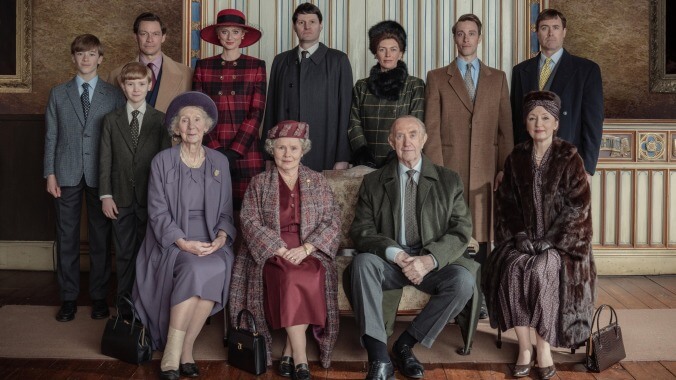The Crown becomes even more of a Corleone drama in season 5
The Netflix show's latest offering deepens the similarities between the Royal family and Francis Ford Coppola's crew

The emotional linchpin is a man stuck between the dying embers of a marriage and the unceasing devotion he holds to his family. His mother, meanwhile, is a staunch advocate of tradition. And between them stands another family member, sobbing over an arc that could have exhibited each and every one of their strengths, and not their weaknesses. Welcome to The Crown, although that synopsis, with some tweaks, could also easily apply to The Godfather trilogy, a blazing, unrestrained elegy of a family struggling to match their personal philosophies with the changing demands of their adopted homelands.
Agitation and irritation are the key adjectives to describe The Crown, which recently dropped a fifth season that assembles the most starry troupe of actors the show has rounded up yet. It’s a serial that posits a Britain that’s almost as sorrowful (and arguably more complex) than the America depicted by Francis Ford Coppola. The comparison is no mere padding: Both enterprises posit a kinetic outlook on human values, laced by a desperation to pursue personal happiness, regardless of the ripples these decisions might place on future members of the tribe. And by experiencing this history audiences get to reflect on the discoveries, glories, and immense failings their antecedents were capable of.
The Crown started off as a lively, lush portrait of a dynasty that has become a staple of the British environment for aeons, before shifting gears to become something more striking, stoic, and Shakespearian. There were numerous supporting characters who flitted in and out of the first two seasons (the boisterous John Lithgow was a particular hoot to watch as Winston Churchill), but by the time The Crown had unveiled its third iteration, the series had moved it center towards Charles Windsor. Broodingly handsome and driven by a desire to fulfill his self-appointed journey, Charles (whether played by Josh O’Connor or Dominic West) is every bit the Adonis as he is Michael Corleone, driven by love but taxed by vain ideals that contradict the odyssey he has set out for himself. Of the two, West’s performance veers closer to Al Pacino’s, especially as the Corleone who had reached the top of his limits as an entrepreneurial presence before nursing his wounds from the ramifications this world has laid out for him.
West makes his debut in the latest rendition of The Crown, a series that leaps from the doldrums of Thatcher’s Britain and into the cold uncertain waters of a newer, trendier decade. Seated between three women—wife, mistress, and mother—West’s character is a man of deep contradiction, considered in his movements, however urgent his motives are. He’s joined by stalwarts Jonathan Pryce and Jonny Lee Miller, each of them as steadfast in their familial quest as the Corleone dynasty are in theirs.
And—yes—as was always inevitable, The Crown’s fifth series is Elizabeth Debicki’s show. She plays Diana Spencer, the cuckolded wife who skirts the line between discontented and vengeful, often within milliseconds of each other. It is an elegiac performance, capturing the hurt, the vulnerability, and the feeble choreography of a woman burdened by the presence of an institution that has shadowed centuries of like-minded princesses. In some ways, the performance mirrors John Cazale’s turn as Fredo, lost in a mist of tradition and tyranny, desperate to show herself as the leader she has always thought herself to be. There’s a tragic pathos to Debicki’s turn, much as there was to Cazale’s.
What’s more, the Windsor clan has an allegiance to agrarian fortitude that’s as durable as the Corleones’ self-appointed pledge to Sicilian Catholic values. In both iterations, the family are tasked with honoring the principles of their people, their predecessors, and their God, customizing these ideologies to fit the convictions and the tastes of the era. And in Charles and Michael, we have two men who are forced to reconcile their failings against the measures and the mantras of their parents, knowing that no matter their intentions, it is their failures, not their innovations, that will outlive them. Both men watch their wives from a distance, knowing that their marriage is yet another chapter of a narrative of disappointment and dishonesty.
Lest we forget, though, that the two characters represent two completely different masks of their creators. As much as the director might deny it, you could say that Michael Corleone is Coppola distilled, echoing the artist’s taut, high-handed approach to his craft. Charles, too, could be seen as a projection of Peter Morgan’s view on the current and future king.
Of course, it’s been standard practice to speculate on the inner workings of a historical figure (playwrights have been composing odes to their royal subjects for centuries), but The Crown boasts one final similarity to the more overtly rhapsodic Godfather films. In both works, the sons (Charles and Michael) turn to their mothers for guidance, context, and absolution. And in their private exchanges, both men, shackled by deference to a bygone era, come to realize something about themselves. It’s not their lack of responsibility nor their susceptibleness that has caused them so much sorrow as adults. It’s their humanity that catches them completely and utterly off guard.